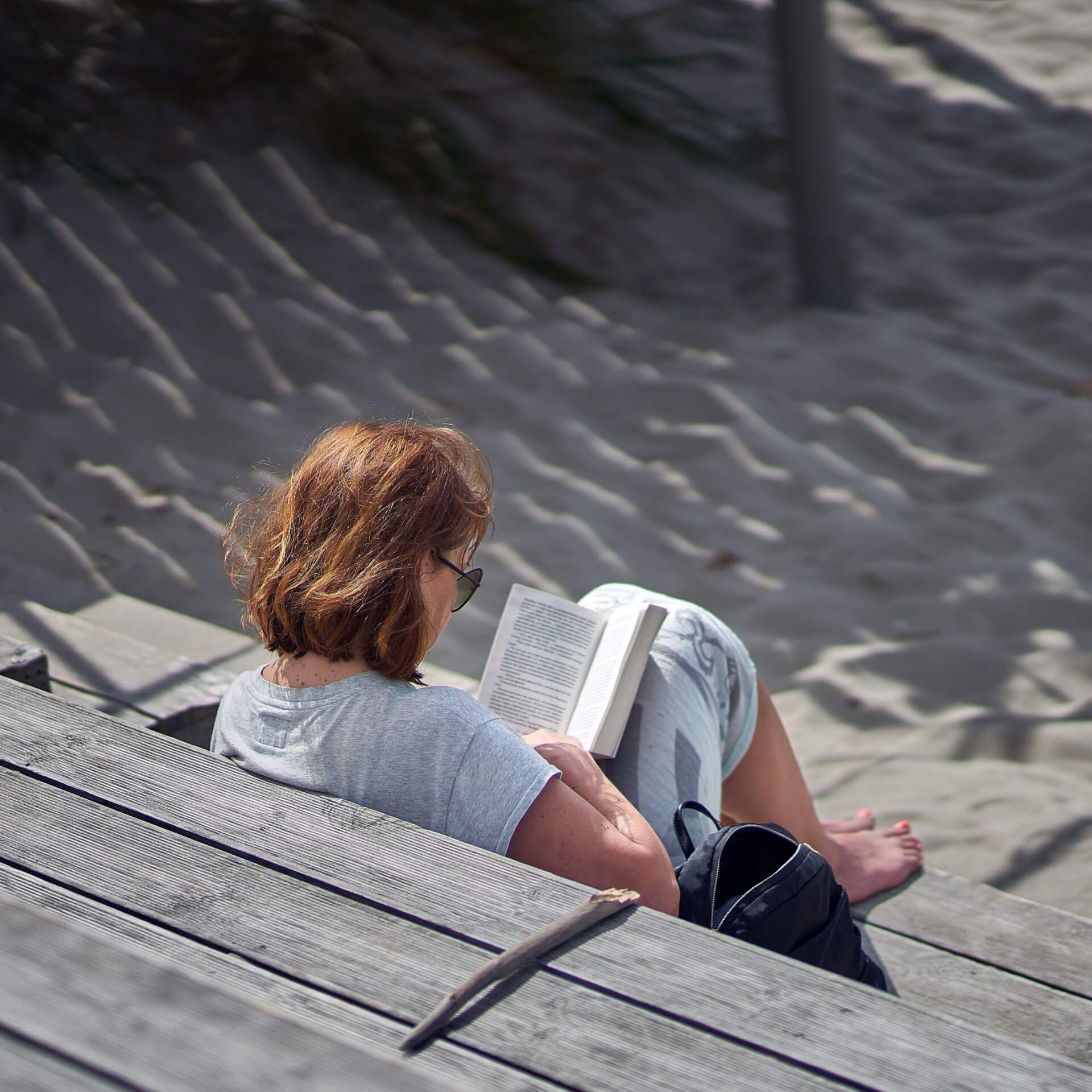
My baby’s asleep at last, but instead of grabbing the vacuum and mop I grab a coffee and the novel I started the day before. Soon I’m in another world, I’m another person. There are no piles of laundry to contend with here, no dishes to clean or people to take care of. I feel […]
My baby’s asleep at last, but instead of grabbing the vacuum and mop I grab a coffee and the novel I started the day before. Soon I’m in another world, I’m another person. There are no piles of laundry to contend with here, no dishes to clean or people to take care of. I feel my body unwind, a slow release of pressure that has built up over the last few hours of caregiving and housekeeping. My mind and body melt into this other existence, and when my coffee’s finished and I close my book I feel lighter, renewed and ready to take on the day.
In an article for The New Yorker, Ceridwen Dovey describes reading fiction as “a way of treating ourselves better. Reading has been shown to put our brains into a pleasurable trance-like state, similar to meditation, and it brings the same health benefits of deep relaxation and inner calm.”
Reading has always been an essential part of my life, but I haven’t always given it the time of day. I often find myself in reading lulls between books that can last weeks, even months. I’ve noticed that it’s during these lulls I have higher stress, anxiety, and am generally less contented than when I make the time to immerse myself in a novel. Turning to reading has seen me through many difficult phases in my life: the death of my father, a miscarriage and, most recently, the stress and emotional depletion of becoming a parent.
In their book, The Novel Cure, Ella Berthoud and Susan Elderkin prescribe fiction for life’s ailments. They call this ‘bibliotherapy’, and promise “temporary relief of your symptoms due to the power of literature to distract and transport.” While the term bibliotherapy was first coined in 1916, the concept dates back to ancient civilisations. In Egypt, ‘House of healing for the soul’ was inscribed above Ramses II’s chamber of books. In ancient Greece, Aristotle wrote about the power of the tragic genre to trigger a catharsis of emotion. Since then, bibliotherapy has taken many forms, from clinical to creative – as structured reading groups, personal recommendations, podcasts and more. Even without partaking in this specific form of book therapy, many can attest to feeling happier when they’re reading. As author Jeanette Winterson says in her memoir, “Fiction and poetry are medicines, doses. What they heal is the rupture reality makes on the imagination.”
FINDING TIME
Of course, we all struggle to make allowances for self-care, and reading is no exception. However, it needn’t be a huge investment in our precious time. A 2009 study by the University of Sussex showed that reading for just six minutes a day can reduce stress by up to 68 percent. If you’re worried about the long-term commitment of a hefty novel or an ongoing series, there are options that require less commitment. A short story anthology or novella such as The Old Man and the Sea by Ernest Hemingway (under 200 pages!) could be just the bite-sized approach you need to jumpstart a reading habit.
A RELATABLE EXPERIENCE
Berthoud and Elderkin ‘prescribe’ novels that relate specifically to the ailments they’re treating. For motherhood they recommend I Don’t Know How She Does It by Allison Pearson and Our Spoons Came from Woolworths by Barbara Comyns; both novels that centre around women and their struggle with motherhood. Reading novels that reflect your own circumstances can be hugely cathartic. The relatability can spark a great release of emotion, whether a tension-releasing cry or big ol’ belly laugh, and help you feel less alone in your experiences.
ESCAPE TO ANOTHER WORLD
You may prefer something completely foreign to your own experiences when delving into a book. Science fiction, fantasy, romance, and other high-stakes stories can transport you as far from your own reality as possible. One of my most recent reads, Leigh Bardugo’s Six of Crows duology did just that. A pair of fantasy heist novels that were so gripping I would sneak pages while feeding the baby and watching TV with my partner.
OLD FAMILIAR
Starting a new novel can be difficult. You don’t know the characters or the setting, it can be confusing and you just can’t quite get into it. If this is a problem you face, try reading an old favourite or picking up a book that inspired a movie or TV show you love. My old favourite is The Princess Bride by William Goldman, and The Perks of Being a Wallflower by Stephen Chbosky is a wonderful book behind the film that offers a completely different experience.
BEING READ TO
On their website, The State Library Victoria states that, “poems and stories, read aloud, open a space for us to dwell quietly away from the noise outside.” Explore the rhythm and pace of reading out loud to yourself. Try an audiobook or literary podcast. The State Library Victoria has their own Bibliotherapy podcast with tips on how to incorporate reading into your self-care routine, such as resisting the urge to multitask.
I woke up early this morning. That may sound counterintuitive to the rest and relaxation I’ve been encouraging, but grabbing that extra hour while my baby and my partner are still snoozing ensures I have time and space to read. I curl up on the couch with my book. Every page I turn feels like a triumph, every paragraph I complete is a deep, centring breath. I’ve done something for me today. As Ceridwen Dovey might say, I’ve taken an important step towards treating myself better. And can’t everyone benefit from a little more of that?























